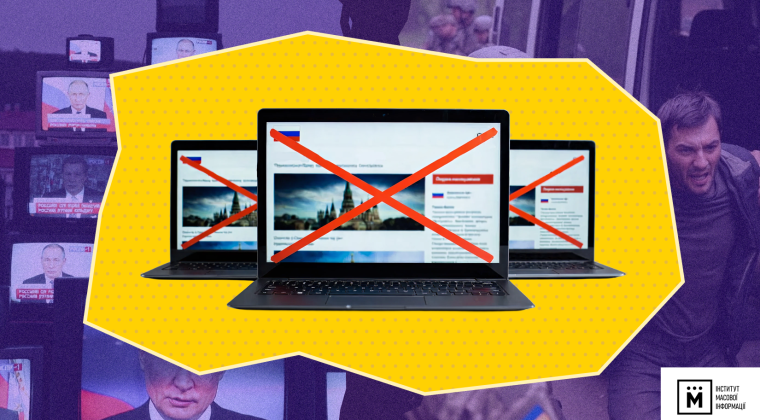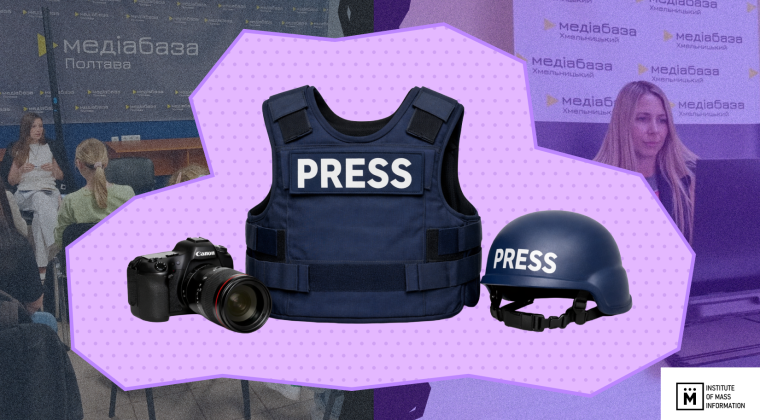Radio Liberty interviewed Oksana Romaniuk, executive director and head of the Institute of Mass Information, about the challenges that Ukrainian journalists faced with the start of Russia’s full-scale war against Ukraine. Among other things, the conversation touched on the “United News” telethon and whether the Ukrainian mass media were able to stand up to Russia’s aggressive propaganda.
“What were the most difficult challenges faced by Ukrainian journalists after the start of Russia’s full-scale invasion of Ukraine?”
“We were very much driven out of our comfort zone – several of those at once, in fact. The first one is the comfort zone of citizenship. Because now there is a choice that each of us has to make every day: to be a citizen and, say, go serve in the army, or to stay in the field, to remain a journalist.
“Many of our colleagues left the profession and went to fight. 42 of our colleagues have already been killed. Every editorial team is covering the war, and every team had to learn how to apply a tourniquet, how to behave during shelling, how to communicate with the military.
“Another challenge has to do with money. Partially destroyed infrastructure – advertisers were affected, businesses were affected, and the media funded by them were affected accordingly.
“There were also content-related challenges. This situation can be somewhat compared to covid: back when it had only just started, 80–90% of the news feed was news about the coronavirus. Now the same is happening with the war. Politicians have left the news feeds, they are effectively absent. There is basically no ‘social network’, there are practically no stories about people, and if those are present, they are related to the war – this is also a challenge for journalists.”
“Every now and then we hear the authorities appeal to journalists, saying: ‘Let’s figure it out after the war.’ Should Ukrainian journalists go along with this?”
“It seems to me that Ukrainian journalists still remain critical and have not become conformists. They criticize the authorities constantly, and the situation with Kherson is very telling. There was a very loud media backlash when journalists were stripped of accreditation: the media community stood united and was actively criticizing the authorities for such an approach.
“But at the same time, there is an understanding that now, amidst the war, some things can indeed cost people’s lives, that is, those things can be subject to military censorship.
“We have a heterogeneous media environment. We now have the ‘United News’ telethon, which has united multiple TV channels.
“At the same time, if we look at the audience statistics, a recent large survey by Internews USAID (‘Media Program’, funded by the United States Agency for International Development. – Ed.) showed that the number of people who watch TV has decreased significantly compared to last year.
“Now it is about 35%, and even a year ago we could not imagine that television audience could be so small.
“Nowadays, unfortunately, people mostly get information on social media: Telegram has grown more than twice the size, and there are also online media and radio. Online media are mostly independent. On Telegram, however, there is a lot of manipulation, a lot of commissioned content or hidden advertising, including political advertising. There are a lot of fakes and value judgments.
“Overall, when it comes to getting independent information of high quality, we have many excellent and independent online resources that compete with each other for content and that are able to provide up-to-date and quality information.
“So I believe that ‘killing the dragon will not make us the dragon.’ Because we (Ukrainian journalists. – Ed.) have gone through situations that pose such tough challenges for journalism several times over the past 20 years. And yet, we preserved our independent media and pluralism.
“Even though we still have such an awkward thing as the ‘United News’ telethon, which, in my opinion, needs to come to an end.”
“What’s wrong with the ‘United News’ telethon?”
“When the telethon was only just starting, it was needed and important. We needed hope, we needed ground under our feet in order to stand and move forward. The telethon was the anchor that allowed many citizens to hold on. It has accomplished it mission.
“As of now, the telethon has become very similar to a linear channel, which has its own programs, it has football, it has some entertainment shows. That is, it is already turning into one linear state TV channel.
“Back in 2005, Ukraine signed a commitment to abandon state television and radio and create independent, public ones. And now, with the ‘United News’ telethon, we have a rollback going on.”
“Did Ukrainian journalism manage to stand up to aggressive Russian propaganda after February 24?”
“You used the correct term, ‘aggressive propaganda’. Just now, at the conference, I was listening to European officials, and they were speaking about ‘propaganda and disinformation’ by one side and the other. Now, as researchers, we no longer use the term ‘propaganda’ or simply ‘disinformation’ when we speak of Russia.
“Because our goal is to ‘package’ this crime as a crime of aggression for a future international tribunal.
“Our goal is that the perpetrators of this crime, those complicit in producing, broadcasting, and funding it, are punished – not just by being sanctioned, but they also must sit behind bars.
“Europe continues to treat Russian propaganda the same way as it did a year ago. And the main tools to counter it are media literacy and refuting fakes. Great methods, but of very little effectiveness.
“We are currently working on legally defining signs of propaganda as a crime of aggression and of genocidal rhetoric. And, of course, Ukraine has never done anything like this. I don’t remember anyone coming out at the ‘United News’ telethon and saying, ‘Let’s drop an nuke on them.’
“But if you compare Ukrainian and Russian propaganda, the Ukrainian side is currently more prompt, more flexible to respond. The Russian rhetoric operates within a narrow and doctrine-defined framework.”



